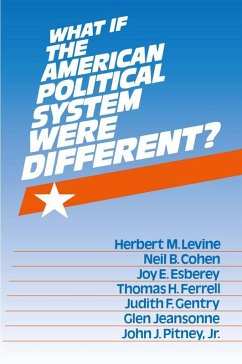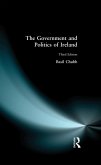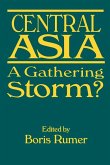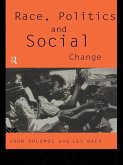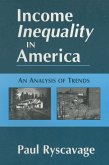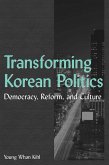Herbert M. Levine
What If the American Political System Were Different? (eBook, PDF)
42,95 €
42,95 €
inkl. MwSt.
Sofort per Download lieferbar

21 °P sammeln
42,95 €
Als Download kaufen

42,95 €
inkl. MwSt.
Sofort per Download lieferbar

21 °P sammeln
Jetzt verschenken
Alle Infos zum eBook verschenken
42,95 €
inkl. MwSt.
Sofort per Download lieferbar
Alle Infos zum eBook verschenken

21 °P sammeln
Herbert M. Levine
What If the American Political System Were Different? (eBook, PDF)
- Format: PDF
- Merkliste
- Auf die Merkliste
- Bewerten Bewerten
- Teilen
- Produkt teilen
- Produkterinnerung
- Produkterinnerung

Bitte loggen Sie sich zunächst in Ihr Kundenkonto ein oder registrieren Sie sich bei
bücher.de, um das eBook-Abo tolino select nutzen zu können.
Hier können Sie sich einloggen
Hier können Sie sich einloggen
Sie sind bereits eingeloggt. Klicken Sie auf 2. tolino select Abo, um fortzufahren.

Bitte loggen Sie sich zunächst in Ihr Kundenkonto ein oder registrieren Sie sich bei bücher.de, um das eBook-Abo tolino select nutzen zu können.
First Published in 2015. Routledge is an imprint of Taylor & Francis, an informa company.
- Geräte: PC
- mit Kopierschutz
- eBook Hilfe
- Größe: 11.48MB
Andere Kunden interessierten sich auch für
![The Government and Politics of Ireland (eBook, PDF) The Government and Politics of Ireland (eBook, PDF)]() Basil ChubbThe Government and Politics of Ireland (eBook, PDF)81,95 €
Basil ChubbThe Government and Politics of Ireland (eBook, PDF)81,95 €![Central Asia (eBook, PDF) Central Asia (eBook, PDF)]() Boris Z. RumerCentral Asia (eBook, PDF)54,95 €
Boris Z. RumerCentral Asia (eBook, PDF)54,95 €![Global Ideologies and Urban Landscapes (eBook, PDF) Global Ideologies and Urban Landscapes (eBook, PDF)]() Global Ideologies and Urban Landscapes (eBook, PDF)48,95 €
Global Ideologies and Urban Landscapes (eBook, PDF)48,95 €![Race, Politics and Social Change (eBook, PDF) Race, Politics and Social Change (eBook, PDF)]() Les BackRace, Politics and Social Change (eBook, PDF)64,95 €
Les BackRace, Politics and Social Change (eBook, PDF)64,95 €![Income Inequality in America: An Analysis of Trends (eBook, PDF) Income Inequality in America: An Analysis of Trends (eBook, PDF)]() Paul RyscavageIncome Inequality in America: An Analysis of Trends (eBook, PDF)46,95 €
Paul RyscavageIncome Inequality in America: An Analysis of Trends (eBook, PDF)46,95 €![Inside India Today (Routledge Revivals) (eBook, PDF) Inside India Today (Routledge Revivals) (eBook, PDF)]() Dilip HiroInside India Today (Routledge Revivals) (eBook, PDF)48,95 €
Dilip HiroInside India Today (Routledge Revivals) (eBook, PDF)48,95 €![Transforming Korean Politics (eBook, PDF) Transforming Korean Politics (eBook, PDF)]() Young Whan KihlTransforming Korean Politics (eBook, PDF)59,95 €
Young Whan KihlTransforming Korean Politics (eBook, PDF)59,95 €-
-
-
First Published in 2015. Routledge is an imprint of Taylor & Francis, an informa company.
Dieser Download kann aus rechtlichen Gründen nur mit Rechnungsadresse in A, B, BG, CY, CZ, D, DK, EW, E, FIN, F, GR, HR, H, IRL, I, LT, L, LR, M, NL, PL, P, R, S, SLO, SK ausgeliefert werden.
Produktdetails
- Produktdetails
- Verlag: Taylor & Francis eBooks
- Seitenzahl: 304
- Erscheinungstermin: 24. Februar 2015
- Englisch
- ISBN-13: 9781317452188
- Artikelnr.: 42370076
- Verlag: Taylor & Francis eBooks
- Seitenzahl: 304
- Erscheinungstermin: 24. Februar 2015
- Englisch
- ISBN-13: 9781317452188
- Artikelnr.: 42370076
- Herstellerkennzeichnung Die Herstellerinformationen sind derzeit nicht verfügbar.
Herbert M. Levine taught political science at the University of Southwest Louisiana for twenty years. In addition to scholarly work, he has published numerous texts on introductory politics, American government, and international relations.
Neil B. Cohen is professor of law at Brooklyn Law School. He is a specialist in constitutional law and frequently writes for law reviews. Professor Cohen has also published a treatise on commercial law.
Joy E. Esberey has taught political science at the University of Toronto since 1970. She is the author of Knight of the Holy Spirit, a biography of Canadian prime minister Mackenzie King. Professor Esberey is especially interested in the comparative study of political systems in the western democracies.
Thomas H. Ferrell is professor of political science at the University of Southwestern Louisiana. His research and writing have been mainly in state, local, and urban politics. Judith F. Gentry is professor of history at the University of Southwest Louisiana. She has served as president of the Southern Association for Women Historians and of the Louisiana Historical Association. Professor Gentry's major research interest is the public finance of the Confederacy; she is also an expert on the problem of eliminating sex bias in vocational education.
Glen Jeansonne is professor of history at the University of Wisconsin-Milwaukee. He has written more than forty articles and four books, including biographies of Leander Perez and Gerald L. K. Smith. (The latter was nominated for a Pulitzer Prize.) Professor Jeansonne was awarded a John D. and Catherine T. MacArthur Foundation fellowship.
John J. Pitney, Jr. teaches government at Claremont McKenna College. He has been a Congressional Fellow of the American Political Science Association and has served as a senior domestic policy analyst in the House of Representatives and as the deputy director of research for the Republican National Committee.
Neil B. Cohen is professor of law at Brooklyn Law School. He is a specialist in constitutional law and frequently writes for law reviews. Professor Cohen has also published a treatise on commercial law.
Joy E. Esberey has taught political science at the University of Toronto since 1970. She is the author of Knight of the Holy Spirit, a biography of Canadian prime minister Mackenzie King. Professor Esberey is especially interested in the comparative study of political systems in the western democracies.
Thomas H. Ferrell is professor of political science at the University of Southwestern Louisiana. His research and writing have been mainly in state, local, and urban politics. Judith F. Gentry is professor of history at the University of Southwest Louisiana. She has served as president of the Southern Association for Women Historians and of the Louisiana Historical Association. Professor Gentry's major research interest is the public finance of the Confederacy; she is also an expert on the problem of eliminating sex bias in vocational education.
Glen Jeansonne is professor of history at the University of Wisconsin-Milwaukee. He has written more than forty articles and four books, including biographies of Leander Perez and Gerald L. K. Smith. (The latter was nominated for a Pulitzer Prize.) Professor Jeansonne was awarded a John D. and Catherine T. MacArthur Foundation fellowship.
John J. Pitney, Jr. teaches government at Claremont McKenna College. He has been a Congressional Fellow of the American Political Science Association and has served as a senior domestic policy analyst in the House of Representatives and as the deputy director of research for the Republican National Committee.
Preface
Introduction
Chapter 1 What If There Were No Written Constitution and Bill of Rights?, Neil B. Cohen
Chapter 2 What If There Were a Unitary Rather Than a Federal System?, Thomas H. Ferrell
Chapter 3 What If There Were Three Major Part ies?, John J. Pitney Jr.
Chapter 4 What If There Were No Television?, Herbert M. Levine
Chapter 5 What If There Were a Parliamentary System?, Joy E. Esberey
Chapter 6 What If There Were No Judicial Review?, Neil B. Cohen
Chapter 7 What If There Had Been No Slavery?, Glen Jeansonne
Chapter 8 What If the 1787 Constitution Had Provided for Equal Rights?, Judith F. Gentry
Chapter 9 What If There Were No Welfare State?, John J. Pitney Jr.
Chapter 10 What if There Had Been No Cold War?, Herbert M. Levine
Introduction
Chapter 1 What If There Were No Written Constitution and Bill of Rights?, Neil B. Cohen
Chapter 2 What If There Were a Unitary Rather Than a Federal System?, Thomas H. Ferrell
Chapter 3 What If There Were Three Major Part ies?, John J. Pitney Jr.
Chapter 4 What If There Were No Television?, Herbert M. Levine
Chapter 5 What If There Were a Parliamentary System?, Joy E. Esberey
Chapter 6 What If There Were No Judicial Review?, Neil B. Cohen
Chapter 7 What If There Had Been No Slavery?, Glen Jeansonne
Chapter 8 What If the 1787 Constitution Had Provided for Equal Rights?, Judith F. Gentry
Chapter 9 What If There Were No Welfare State?, John J. Pitney Jr.
Chapter 10 What if There Had Been No Cold War?, Herbert M. Levine
Preface
Introduction
Chapter 1 What If There Were No Written Constitution and Bill of Rights?, Neil B. Cohen
Chapter 2 What If There Were a Unitary Rather Than a Federal System?, Thomas H. Ferrell
Chapter 3 What If There Were Three Major Part ies?, John J. Pitney Jr.
Chapter 4 What If There Were No Television?, Herbert M. Levine
Chapter 5 What If There Were a Parliamentary System?, Joy E. Esberey
Chapter 6 What If There Were No Judicial Review?, Neil B. Cohen
Chapter 7 What If There Had Been No Slavery?, Glen Jeansonne
Chapter 8 What If the 1787 Constitution Had Provided for Equal Rights?, Judith F. Gentry
Chapter 9 What If There Were No Welfare State?, John J. Pitney Jr.
Chapter 10 What if There Had Been No Cold War?, Herbert M. Levine
Introduction
Chapter 1 What If There Were No Written Constitution and Bill of Rights?, Neil B. Cohen
Chapter 2 What If There Were a Unitary Rather Than a Federal System?, Thomas H. Ferrell
Chapter 3 What If There Were Three Major Part ies?, John J. Pitney Jr.
Chapter 4 What If There Were No Television?, Herbert M. Levine
Chapter 5 What If There Were a Parliamentary System?, Joy E. Esberey
Chapter 6 What If There Were No Judicial Review?, Neil B. Cohen
Chapter 7 What If There Had Been No Slavery?, Glen Jeansonne
Chapter 8 What If the 1787 Constitution Had Provided for Equal Rights?, Judith F. Gentry
Chapter 9 What If There Were No Welfare State?, John J. Pitney Jr.
Chapter 10 What if There Had Been No Cold War?, Herbert M. Levine
